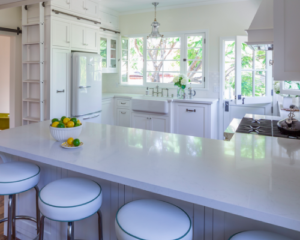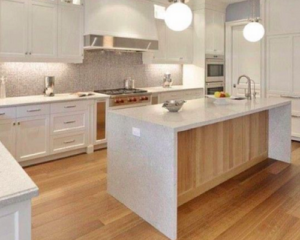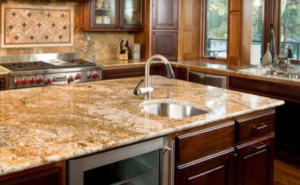 Renovating a kitchen can be an exciting endeavor but even for the experienced design there is a lot to consider. Here are some things to consider as you go so that you don’t overlook anything that could compromise the quality of your finished product:
Renovating a kitchen can be an exciting endeavor but even for the experienced design there is a lot to consider. Here are some things to consider as you go so that you don’t overlook anything that could compromise the quality of your finished product:
1. Decide “Why” You are Renovating
Are you renovating the space to add features? Get an updated, more modern aesthetic? Or to better use the space? Make sure to decide on achievable goals before you get started so that you don’t get sidetracked. It’s important to have a clearly defined path.
2. Use Visual Planning Tools
It’s important to know how everything will look and work together before you start installing new elements. Collect samples of different woods or tiles; collect paint swatches; cut-out images from magazines or computer print-out of appliances or furniture that you want to include. Not only will this help you envision the finished product but you can pin to all together on a board to keep your purchasing focuses on the agreed upon theme. Check out our handy planning guide for more great resources.
 3. Consider “Timeless” Design Trends
3. Consider “Timeless” Design Trends
Design trends come and go so quickly – what’s fashionable this year will be out-of-style next year. As easy as it may be to get caught up in the latest trends, sticking to timeless design schemes will ensure that your renovations don’t become immediately outdated. Look back at the trends of the last decades and make note of elements that stood the test of time.
4. Pay Attention to Small Details
It’s easy to dedicate all your time and energy to the big, important elements of your kitchen, but it’s the small touches that really pull any space together and make it your own. Things like choosing the right backsplash or faucet style will make all of the difference for the finished product. It’s the smallest touches that really bring life to any room.
5. Start with the Appliances
Appliances obviously play a crucial role in any kitchen. Research which ones will work best for you and use that as a starting point for your new look. You’ll want to consider things like a fridge, dishwasher, and stove first and then any assortment of other items you may find yourself wanting to include. Knowing what appliances you will be working with can help you account for spacing issues in order to correct them ahead of time. You can also consider having smaller appliances, like toaster ovens or coffee makers, that match for a really polished and professional feel.
6. Leave Demolition to the Experts
I know that it’s exciting to get started and you may be feeling a bit impatient with all of the planning. But by clumsily dismantling your current kitchen yourself, you may do more damage than good, which can drive up repair expenses. Professional dismantling may also be able to salvage some materials for reuse, which can save time and money later.
7. Prepare to Spend Time
If all goes according to plan, a quick kitchen renovation may take anywhere from 4 to 6 weeks. If any complications occur, it can take even longer. You’ll want to have a plan in place for those long weeks without a kitchen. Where will you plug in your fridge in the meantime? Do you have sinks elsewhere that you can use for dishes, if necessary? Do you have a BBQ you can use for cooking meals? Can you budget for take-out while you wait? These are things to keep in mind.
8. Time Things Out
In order to prevent any mishaps, try to avoid installing anything that might get damaged as the renovations continue. Any surfaces (countertops, etc.) that are laid down run the risk of being dinged, stood on, having tools strewn about on them, or other such things as the renovations continue. If there is a new addition added that is at risk of being damaged as the renovations continue, be sure to cover it with plastic, blankets, or sheets in order to protect it.
 9. Don’t Cut Costs – Think of it as an Investment
9. Don’t Cut Costs – Think of it as an Investment
Lower labor costs and cheaper appliances may seem tempting, especially as the renovation costs start adding up. However, you want your renovations to add value to your home in the long run, you need to make your investments count. You will want to spend more on things that add value and lifespan to your newly designed kitchen.
10. A Little Goes a Long Way
Can’t afford a complete renovation? There are plenty of smaller changes and improvements that you can make to give your kitchen a fresh and new feel. Look for small details that catch the eye: new cupboard and drawer handles, a new backsplash, a new facet for your sink, or new lighting. A few key updates will let you create a “new” kitchen even on a tight budget.
Conclusion
While there are a lot of moving parts when it comes to renovations, RJS Stonetops is your trusted source when it comes to planning, countertops and renovating. Our skillful crews can handle any job – trust us! Visit our beautiful showroom in Richmond to view samples and speak with a specialist. We look forward to serving you!
